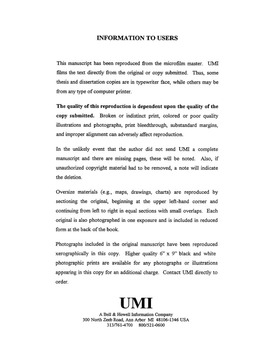| dc.contributor.advisor | Hobbs, Catherine, | en_US |
| dc.contributor.author | Dew, Debra L. Frank. | en_US |
| dc.date.accessioned | 2013-08-16T12:30:32Z | |
| dc.date.available | 2013-08-16T12:30:32Z | |
| dc.date.issued | 1999 | en_US |
| dc.identifier.uri | https://hdl.handle.net/11244/5818 | |
| dc.description.abstract | This study addresses the absence of female rhetors and theorists from the modern rhetorical tradition as a minor tradition within the western tradition as exemplified within Bizzell and Herzberg's The Rhetorical Tradition : Readings from Classical Times to the Present (1994) and Winifred Horner's The Present State of Scholarship in Historical and Contemporary Rhetoric (1990). Wollstonecraft's contribution to the modern tradition is extrapolated and conceptualized through an analysis of the principles she formulates and the textual strategies she employs within both of her Vindications and Thoughts on the education of daughters. | en_US |
| dc.description.abstract | Chapter one argues for the recovery of her theoretical work through a critical rereading of her primary texts. The study assumes a desegregated stance as it puts Wollstonecraft's recovered theory into play with classical theories that precede it and with those formulated by George Campbell and Hugh Blair, as modern theorists. As a feminist project, it analyzes Wollstonecraft's struggle for subjectivity within the gendered western tradition. Chapter two conceptualizes and critiques a rhetoric of sensibility as constitutive of women's rhetorical practice in Great Britain during the eighteenth century. Chapter three conceptualizes her rhetorical theory as with a comparative analysis of her understanding of the classical pisteis---ethos, pathos and logos---alongside of Campbell and Blair's treatment of the appeals. Chapter four conceptualizes her understanding of the classical canons of invention, arrangement, style, memory and delivery in like manner. | en_US |
| dc.description.abstract | Wollstonecraft's theory may be understood as a hybrid that is modern, feminist, and revolutionary. As a modern working within the western tradition, she understands and variously incorporates neoclassical elements. She also refigures these elements according to the epistemological dictates of the New Science. Her theory is feminist in its aims: she secures a subject position for women and inserts women's knowledge into civic discourse. As a skillful rhetor, she imbibes and dispenses revolutionary values and appeals to effectively address the sociopolitical issues of the late eighteenth century. Her work both extends and disrupts the masculine western tradition that precedes her and the modern tradition that scaffolds her theoretical enterprise. | en_US |
| dc.format.extent | vii, 219 leaves ; | en_US |
| dc.subject | Wollstonecraft, Mary, 1759-1797 Criticism and interpretation. | en_US |
| dc.subject | Literature, English. | en_US |
| dc.subject | Language, Rhetoric and Composition. | en_US |
| dc.subject | Literature, Modern. | en_US |
| dc.title | On the use of significant words: Mary Wollstonecraft's contribution to the modern rhetorical tradition. | en_US |
| dc.type | Thesis | en_US |
| dc.thesis.degree | Ph.D. | en_US |
| dc.thesis.degreeDiscipline | Department of English | en_US |
| dc.note | Source: Dissertation Abstracts International, Volume: 60-05, Section: A, page: 1536. | en_US |
| dc.note | Chair: Catherine Hobbs. | en_US |
| ou.identifier | (UMI)AAI9930535 | en_US |
| ou.group | College of Arts and Sciences::Department of English | |
